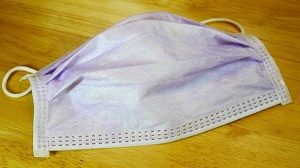The selection and use of face masks with regard to protection from Coronavirus, a.k.a, COVID-19, confuses many people. That is understandable, since the experts, most notably, Dr. Fauci, have radically shifted the position and statements about the use of facemasks. At first he said we should not purchase an N95 respirator, as they would not be effective, and now he says we should just cover our faces with any old piece of cloth... and should do that for the rest of time.
We'll try to straighten out facts from government policy and social convention below!

A logical starting place is to understand what the goal of wearing a facemask is.
That's it... there's really no other medical purpose than these two.
According to the AAMC:
Mounting scientific research shows that widespread wearing of masks, along with practicing social distancing and frequent hand-washing, would greatly reduce community transmission of the virus. The effectiveness of masking was recently highlighted by a study that found two COVID-19-positive Missouri hair stylists did not pass the virus on to any of their 139 clients. The stylists and their clients wore masks.
It is noteworthy that they cite the effectiveness of "widespread" wearing of face coverings only in conjunction with "social distancing and frequent hand-washing". In other words, by themselves, the face masks are not very effective at stopping the spread of COVID for the person wearing a mask..
The Mayo Clinic makes a similar statement:
Yes, face masks combined with other preventive measures, such as frequent hand-washing and social distancing, help slow the spread of the virus.
Theses statements and those made by other medical authorities are general statements about the value of wearing face coverings to a society in slowing the spread of COVID. Unfortunately, none of them present any hard data. Nor have we found a single scientific study of a rigorous nature that examined large numbers of individuals wearing face coverings, compared with those who didn't. As near as we can tell, their conclusions about face mask wearing are largely, if not entirely, conjecture. The studies the AAMC cites above are just 2 case studies, not a reproducible scientific experiment nor a study of a large scale population. . If you are aware of a true scientific study regarding the effectiveness of wearing face masks, please use the feedback page to tell us about it and provide a link to it's source.
There is another reason for wearing a wearing a nonmedical or homemade mask ; giving some confidence to others that they are at less risk from you, if you are asymptomatic.
Many state and federal government agencies offer the following standard guidance:
Wear a face covering when:
The governments are popularizing the phrase: "my mask protects you, your mask protects me."
Many large companies: Costco, Sam's Club, Walmart, Target, Kroger, etc are all requiring customers to wear face masks.
So any face covering (with the possible exception of a crocheted homemade face mask) will help to minimize the outward projection of a wearer's respiratory droplets from coughs, sneezes and speaking.
But obviously some masks are more effective than others at protecting the user from inward inhalation of droplets and pathogens.
For the goal of protecting the wearer from inhaling pathogens, the mask must be a medical-grade mask and properly fitted and worn correctly.
For more information about medical grade face masks, click here.
The CDC recommends that these groups should not wear a facemask or face covering:
Ways to save money AND help the environment:
Eat healthier AND save money: Instant Pot Duo Crisp 11-in-1 Air Fryer and Electric Pressure Cooker Combo with Multicooker Lids that Fries, Steams, Slow Cooks, Sautés, Dehydrates
Save water AND money with this showerhead adapter, it lets the water flow until the water is hot, then shuts off water flow until you restart it, ShowerStart TSV Hot Water Standby Adapter
Protect your health with these:
Mattress Dust mite-Bedbug protector, 100% Waterproof, Hypoallergenic, Zippered
Handheld Allergen Vacuum Cleaner with UV Sanitizing and Heating for Allergies and Pet, Kills Mite, Virus, Molds, True HEPA with Powerful Suction removes Hair, Dander, Pollen, Dust,
Immune Support Supplement with Quercetin, Vitamin C, Zinc, Vitamin D3
GermGuardian Air Purifier with UV-C Light and HEPA 13 Filter, Removes 99.97% of Pollutants
5 Stage Air Purifier, Features Ultraviolet Light (UVC), H13 True Hepa, Carbon, PCO, Smart Wifi, Auto Mode, Quiet, Removes 99.97% of Particles, Smoke, Mold, Pet Dander, Dust, Odors
Interesting Reads:
THE PREPPER'S CANNING & PRESERVING BIBLE: [13 in 1] Your Path to Food Self-Sufficiency. Canning, Dehydrating, Fermenting, Pickling & More, Plus The Food Preservation Calendar for a Sustainable Pantry
The Backyard Homestead: Produce all the food you need on just a quarter acre! Paperback
The Citizens' Guide to Geologic Hazards: A Guide to Understanding Geologic Hazards Including Asbestos, Radon, Swelling Soils, Earthquakes, Volcanoes
The Uninhabitable Earth: Life After Warming
Book: The Sixth Extinction: An Unnatural History Paperback